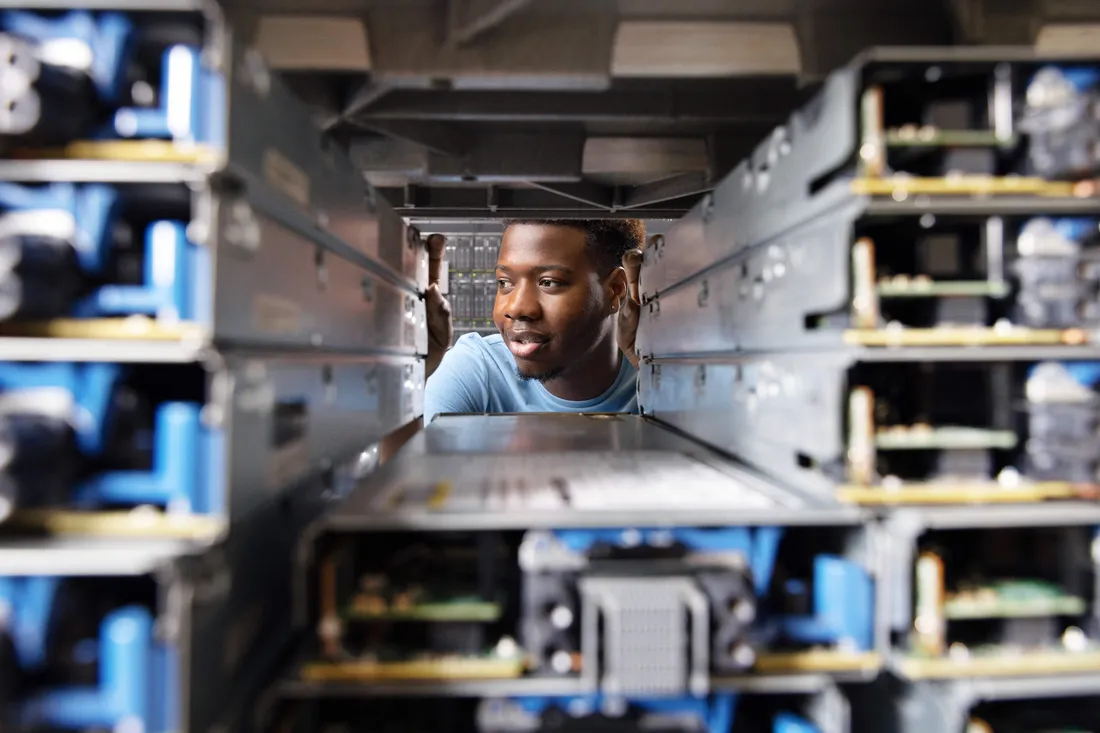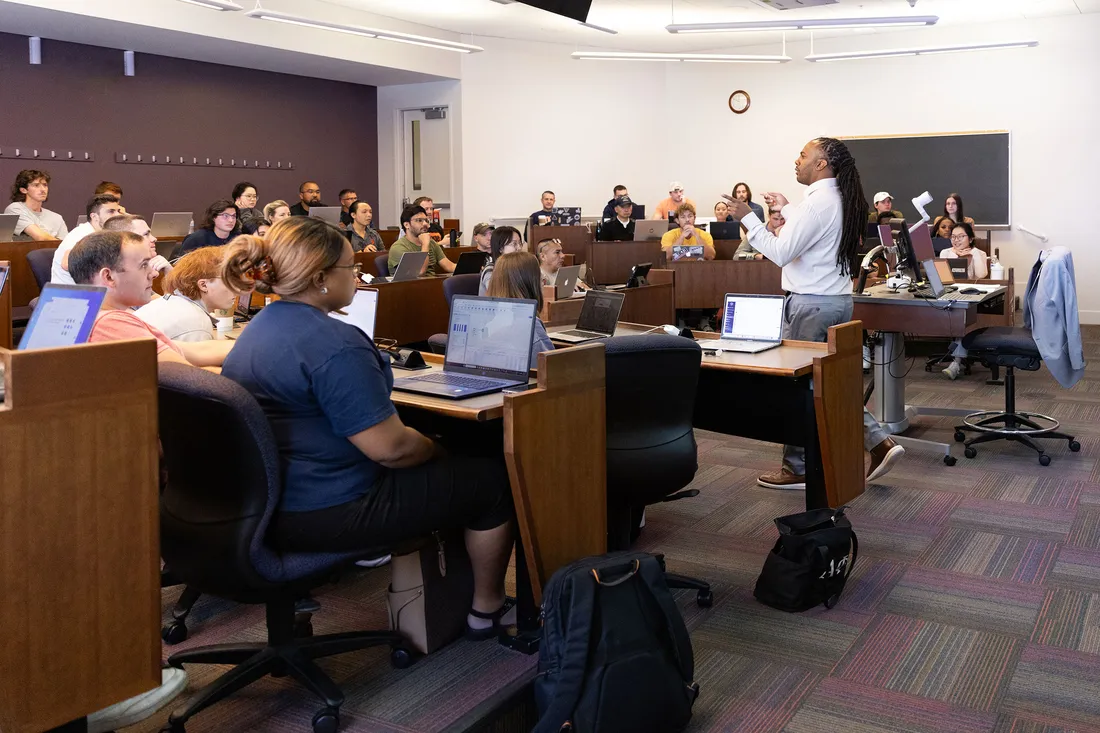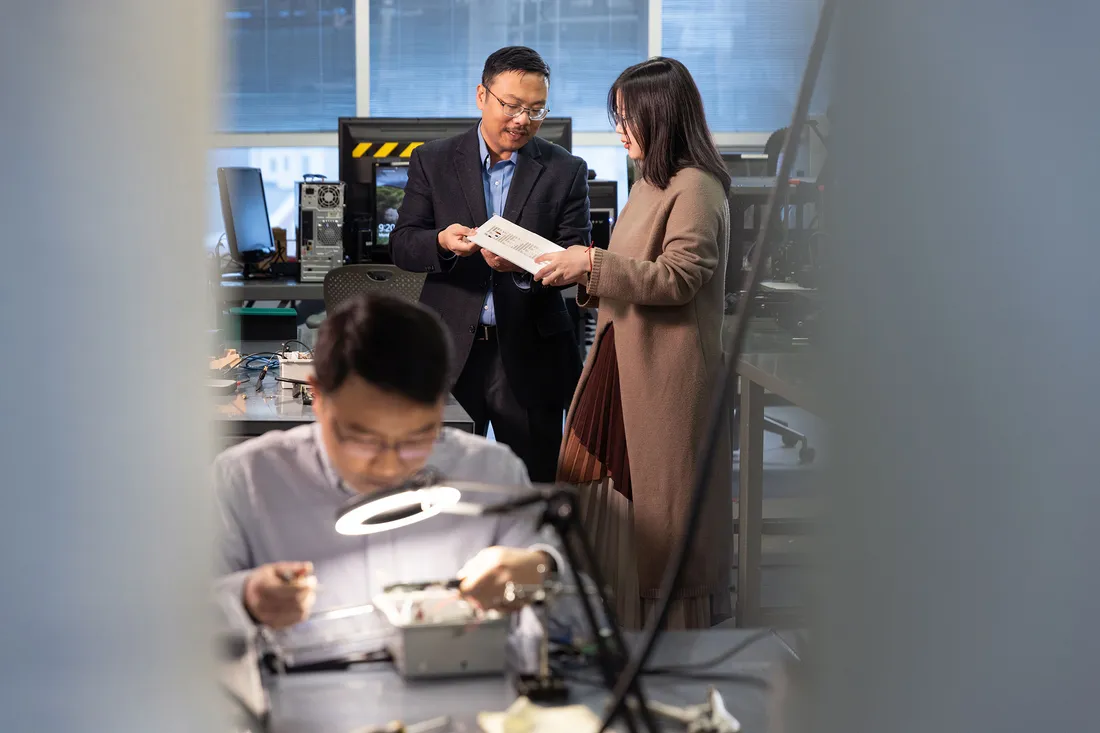
When Chinese native Yapan Liu G’18 enrolled at Syracuse University, he didn’t have far to go, figuratively speaking. The inland city of Yangzhou, where Liu began his academic and professional careers, is like Syracuse, brimming with parks, canals and diverse architecture. Both cities also are experiencing urban development.
Just so happens that Liu’s doctoral advisor, Bing Dong, is from the same eastern province.
“I feel like I can relate to Professor Dong,” says Liu of the rising star in smart building design and operation. “He passionately bridges the gap between academic research and real-world application.”
A doctoral candidate in mechanical and aerospace engineering (MAE), Liu examines the impact of new technologies on the built environment. He’s particularly interested in building performance simulation and occupant behavior in buildings on an urban scale.
Both fields, Liu explains, rely on computational modeling to determine how buildings “behave” under different environmental conditions. Their data is used to not only reduce the carbon imprint of the built environment, but also improve the comfort, safety and productivity of its occupants.
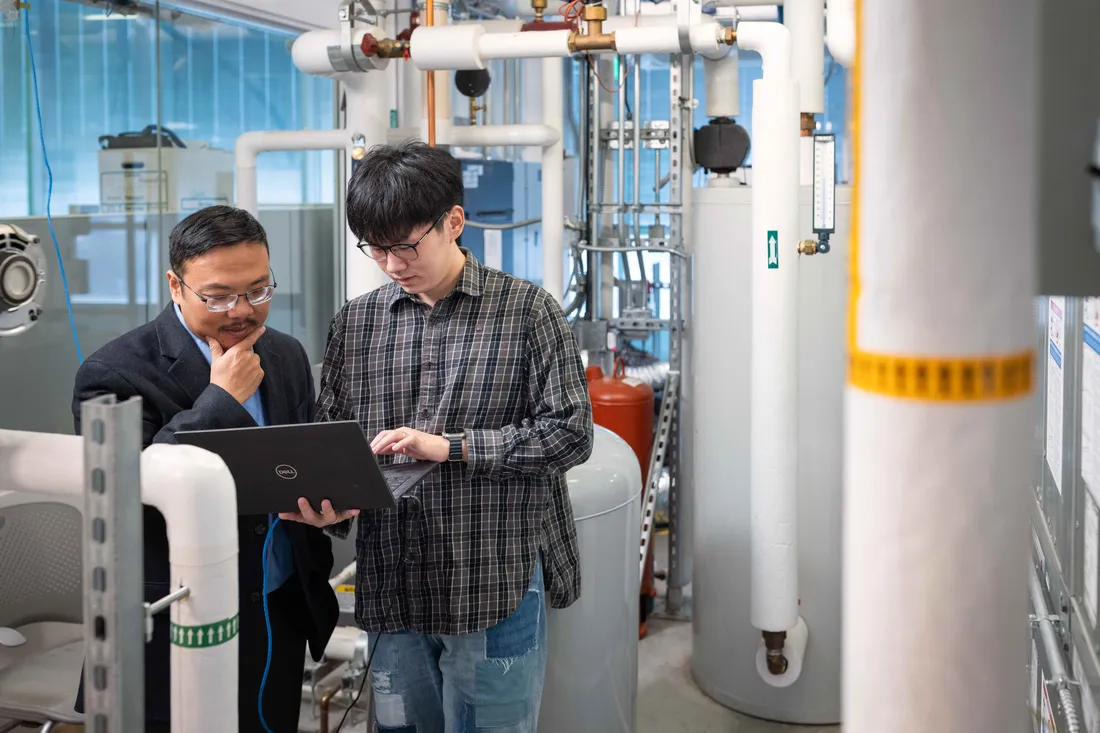
Dong with Ph.D. student Xuezheng Wang (right), a member of the Honeywell Syracuse Next Generation Indoor Air Quality Research Project. “Professor Dong is broadening my horizons,” Wang says.
“In the United States, more than 40% of all energy consumption and carbon emissions comes from human-made structures, like buildings, parks, roads and utilities,” he continues.
Liu is part of Dong’s Built Environment Science and Technology (BEST) Lab, located at the Syracuse Center of Excellence in Environmental Energy Systems (SyracuseCoE). A hub for clean energy innovation, SyracuseCoE enables Dong, Liu and others to investigate building controls and occupant behavior modeling.
“My students draw on research in control engineering, mathematics, physics, architecture and human performance,” says Dong, who came to Syracuse in 2019 from The University of Texas at San Antonio.
In addition to the BEST Lab, he oversees SyracuseCoE’s Grid-Interactive and Energy Efficient Building team. Almost everything Dong does is in the name of net-zero energy consumption. “We have no choice—our future depends on it,” he says.
He (Bing Dong) passionately bridges the gap between academic research and real-world application.
Ph.D. candidate Yapan Liu
Doing Their BEST
Dong is based in the College of Engineering and Computer Science, where, last year, he co-authored a first-of-its-kind paper in Applied Energy about the future potential of quantum computing on building performance.
A likely beneficiary of such technology is the U.S. power grid, a vast network of power plants, utilities and power lines. “Municipalities need to coordinate energy consumption in new ways—something that’s beyond the reach of classical computers and even supercomputers,” says Dong, who earned a Ph.D. in building performance and diagnostics from Carnegie Mellon University. “Our lab is just scratching the surface.”
Doctoral candidate Xuezheng Wang G’21 co-authored the article. “Professor Dong understands the difference between academic and industry research. He’s giving me experience in both areas while broadening my horizons.”
Colleagues also heap praise on Dong, as evidenced by his receipt of a 2023 World Fellowship from the International Building Performance Simulation Association (IBPSA). Nominated by six global experts, he is the University’s first such fellow and one of only two U.S. members of the biennial, 12-person cohort.
“I’m glad that Dr. Dong’s leadership and contributions are being recognized internationally,” notes Young Moon, the William J. Smith Professor of Manufacturing Enterprises and chair of MAE. “He deserves the recognition.”
The IBPSA fellowship is the latest in a string of accomplishments for Dong that includes a 2023 Distinguished Service Award from the American Society of Heating, Refrigerating and Air-Conditioning Engineers (ASHRAE), in which he was the only New York state honoree.
Dong also has a dozen patents, more than 130 peer-reviewed papers and approximately 9,000 citations to his name.
One of his research projects is with Honeywell International, measuring the performance of new and emerging indoor air technologies. His work takes place at SyracuseCoE, involving the BEST Lab and the Honeywell Indoor Air Quality Lab.
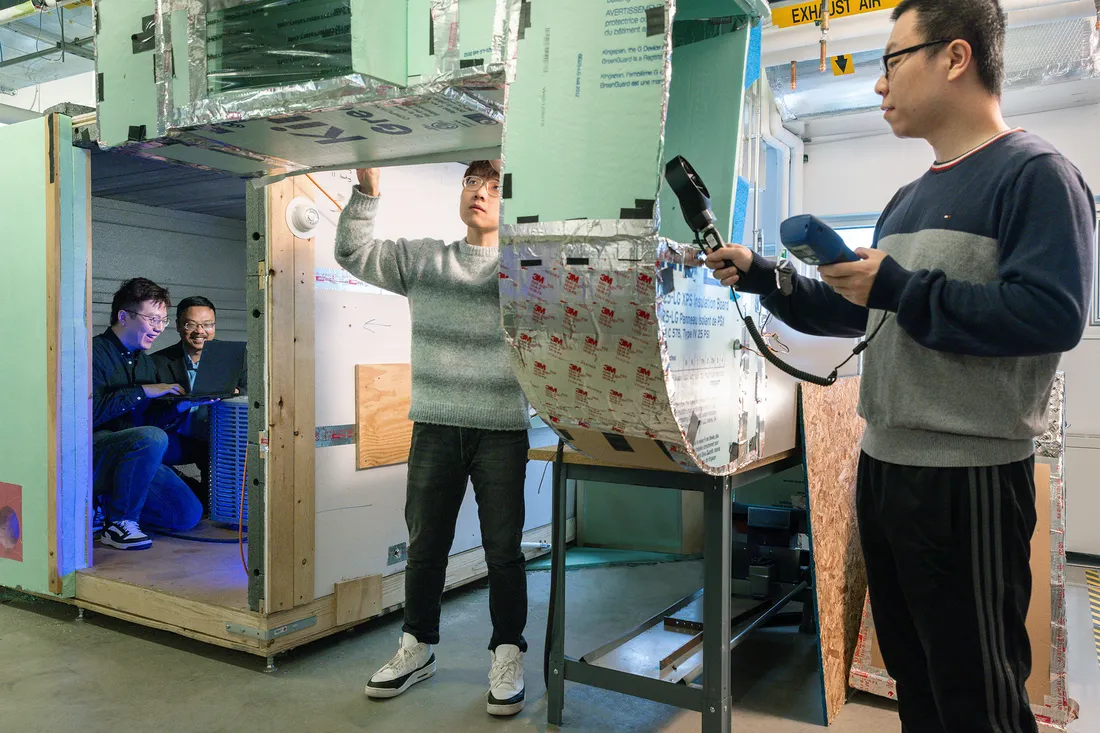
Dong tests a new heat pump technology with (from left) Ph.D. students Zixin Jiang and Yuewei Li and postdoctoral researcher Zhipeng Deng, who’s holding a flow sensor.
“We help building owners and operators determine which technologies meet their energy needs,” says Wang, whose modeling uses different types of artificial intelligence, like machine learning. “Someday, I hope to replace an existing building control system with one of my own.”
Dong’s other projects include two international working groups, which are analyzing the link between comfort-related occupant behavior and building energy performance; multiple heating, ventilation and air conditioning (HVAC) studies for Carrier Global Corporation and Delos; and a major retrofitting initiative on Syracuse’s South Campus, led by Architecture Professor Nina Wilson.
Liu also has assisted Dong on several high-profile assignments, including ones backed by ASHRAE and the federal government. “Professor Dong pushes us to think big,” Liu says. “We’re turning challenges into opportunities.”
A Heated Subject
Dong marvels at the interplay between human behavior and energy use. “Although we spend 90% of our time indoors, we often take indoor air quality for granted. We don’t realize how much it affects our mood and productivity,” says the NSF CAREER Award winner. Small wonder that sustainability is rife with myths and misconceptions.
He recently found that people who use solar panels and electric vehicles (EV) don’t always make the impact they expect. For instance, some residential customers in Arizona are experiencing an 18% spike in electricity consumption because they think solar panels are “free.”
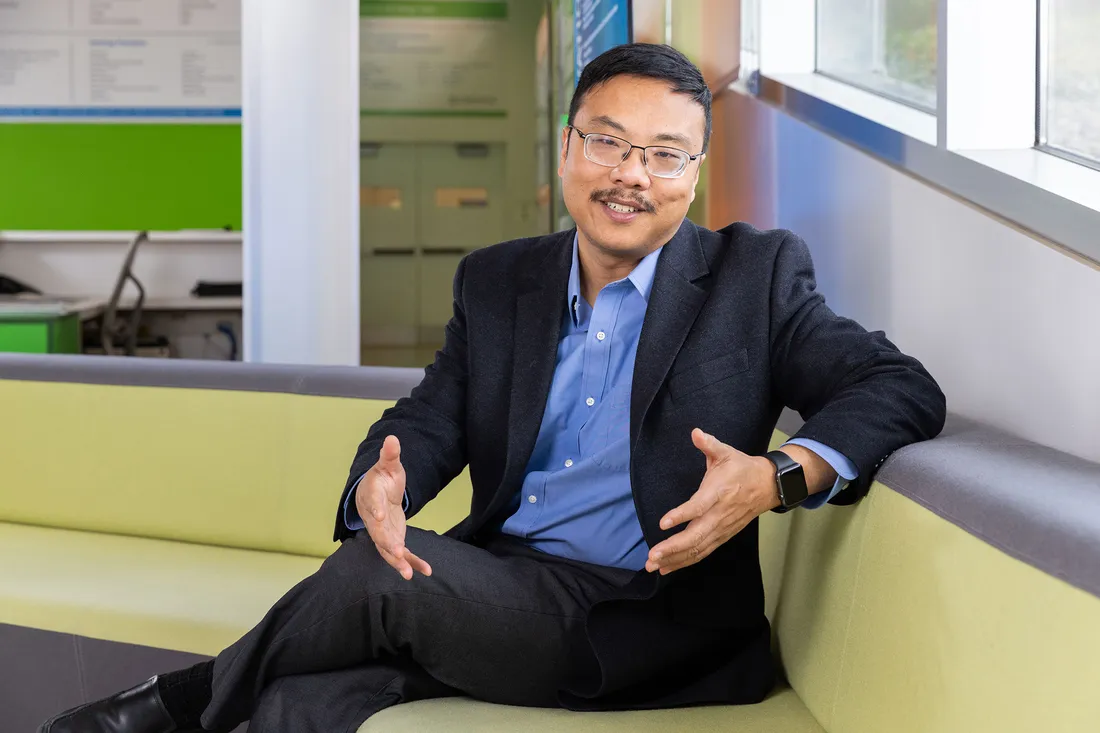
“Small changes can reduce grid stress,” says Dong, a leader in the study of human-building interaction. He’s the University's first recipient of a World Fellowship from the International Building Performance Simulation Association.
“Small changes, like doing your laundry or charging your EV during off-peak times, can reduce grid stress,” says Dong, who’s working on a project co-sponsored by the NSF, National Grid and the Electric Power Research Institute in California.
As more states strive for 70% renewable energy by the end of the decade and net-zero emissions by 2050, pioneers like Dong—and students like Liu and Wang—find themselves on the cusp of a collective energy-conscious mindset.
“The decisions we make, the products we purchase and the policies we support have widespread implications,” Dong says. “Each of us needs to have skin in the game.”

